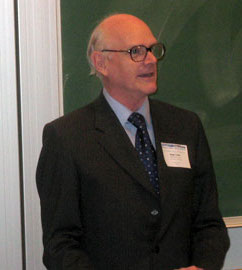Roger Carter (1934 - 2022)
Roger Carter was born on August 25th 1934 near Bradford and died in Wirral on 21st February 2022, aged 87. He is well known for his many important contributions to group theory, and especially the theory of reductive algebraic groups and Lie theory. He was also the author of several well known books, in particular the canonical reference Simple Groups of Lie Type (Wiley 1972). He was a professor and central figure in the Warwick Mathematics Department almost from the start of the Institute’s life until his retirement in 2001.
 |
Roger spent his early childhood in the north, first in Yorkshire and then in Cumberland. His father was an Income Tax Inspector which meant quite frequent moves. He went to junior school in Chesterfield and then to Barnsley Grammar School for Boys where he excelled in mathematics. He won an open scholarship to Sidney Sussex College, Cambridge and, after taking a first class degree, stayed on in Cambridge, writing a Ph.D. thesis under the supervision of Derek Taunt.
After completing his Ph.D. in 1959, he went on to a postdoctoral year at the University of Tübingen and in 1960 he took up a lectureship in Newcastle. In 1965 he joined the newly founded Mathematics Department at Warwick as part of the original algebra group under the leadership of Professor J. A. (Sandy) Green (later FRS). Sandy had chosen Roger as his Reader to help him build up the department and together they organised the second Warwick Symposium on Finite Groups in 1966-67. Roger was promoted to a chair in 1970.
During his year in Tübingen, under the influence of P. Hall and H. Wielandt, Roger introduced the notion of what is now called a Carter subgroup, that is, a nilpotent and self-normalising subgroup of a finite group. He proved that any finite solvable group has a Carter subgroup, and that all its Carter subgroups are conjugate (and therefore isomorphic). This idea marked the beginning of the post-1960 theory of solvable groups. If a group is not solvable it need not have any Carter subgroups: for example, the alternating group A5 of order 60 has no Carter subgroups. In 2006, Vdovin showed that even if a finite group is not solvable, then any two Carter subgroups are conjugate.
Roger worked closely with George Lusztig who came to Warwick in 1971 as a Research Fellow, subsequently being appointed Lecturer and then in 1974, Professor. After Lusztig left Warwick for MIT in 1978, Roger visited him in the US. He frequently spoke of Lusztig’s departure with regret. They wrote two major joint papers: On the modular representations of the general linear and symmetric groups (Math. Zeitschrift, 1974) and Modular representations of finite groups of Lie type (Proc. LMS, 1973). Roger also worked on the canonical basis for a quantum group shortly after its introduction by Lusztig.
In a 1972 paper in Compositio Mathematica, Roger gave the first unified approach to the conjugacy classes of a Weyl group using the notion of the admissible diagram of a group, together with a beautiful geometric characterisation of the absolute length of an element in a Weyl group, that is, its shortest expression as a product of a reflections. He also wrote two further books: the monograph Finite Groups of Lie Type: Conjugacy Classes and Complex Characters (Wiley, 1985) which contains much detail of the character theory and conjugacy classes of finite groups of Lie type, and an advanced textbook, Lie algebras of finite and affine type (CUP 2005), containing many details of this central area of mathematics.
Roger provided strong and effective leadership of the algebra group at Warwick for many years, offering much help and advice to members of the group. His seminar talks were always wonderfully presented, explaining very difficult ideas in an understandable way, and he gave many beautiful expository talks. He organised two further Warwick Symposia, on Group Theory in 1972 - 73 and on Groups, Rings and Representations in 1990 - 91.
He served as chairman of the Mathematics Institute in the late 1970s, which role he performed with meticulous care and attention to detail. He was very popular as an undergraduate lecturer, much appreciated by tutees who regularly commented how excellent he was, with very clear and accurate lecture notes, and a pace of delivery that was perfectly judged for the average student. He was also very popular and effective as a postgraduate supervisor and supervised no fewer than 17 Warwick Ph.D. students.
Roger was generally very calm, dignified and in some respects unusually reserved, although he talked with enthusiasm about mathematical ideas which excited him and could speak forcefully on academic topics on which he held strong opinions. Although a very private person, he was generous with his time and frequently invited his students and colleagues to restaurant meals at his expense.
Roger had a lifelong love of classical music and was, for some years, organist at Holy Trinity Church in Leamington Spa. He also sang as a bass in the Royal Leamington Spa Bach Choir. Following his retirement, he continued to live in Leamington, moving to a home in the Wirral in 2019.
Roger’s impact on his field was substantial and his work will influence the direction of future research in Lie theory for many years to come. He was a top class mathematician and, first and foremost, an extremely kind person. He will be sadly missed by many mathematicians around the world.
Caroline Series – based on contributions from Audrey Edwards (née Carter), David Epstein, Derek Holt and Bethany Marsh.
